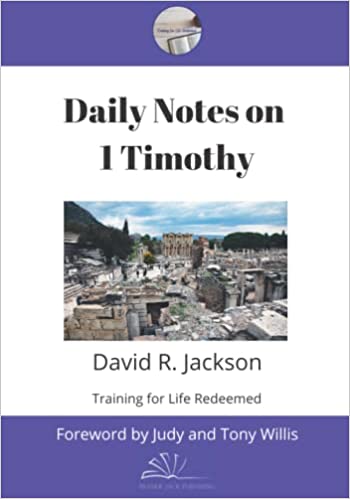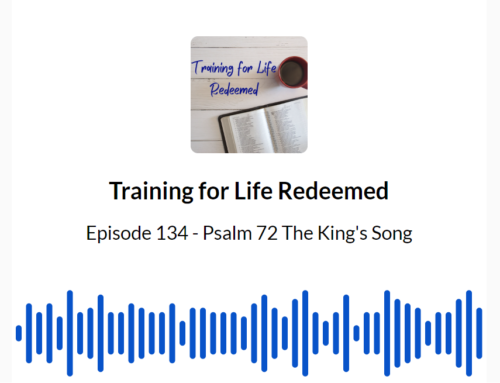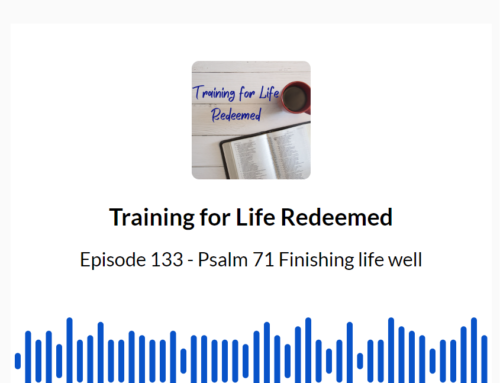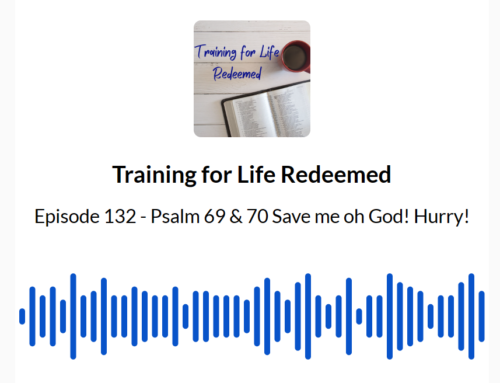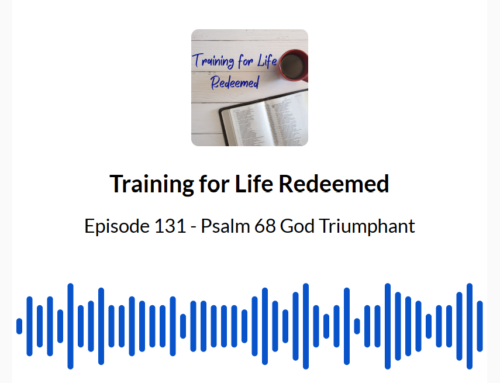Paul talks about the challenges of welfare ministry, honouring church leaders and holding them accountable, and then warns Timothy concerning the traps and threats he faces as he leads God’s family in Ephesus.
Get the book: Daily notes on 1 Timothy
Take the challenge to work through Paul’s first letter to Timothy over ten days. The notes will inform, and set you thinking. They are easy to read in under twenty minutes. They include colour photographs and a section for further reflection or discussion. Ideal for those who want to be prepared to read the Bible with first-time readers. At the end there is a section on words and their meaning, as well as who’s who in 1 Timothy.
Grab your notes for this episode by completing the form
and we will send you the link to all our notes.
Transcript
Dan:
Hi, everyone. And welcome again to the effective teaching podcast. I am your host, Dan, and as always, I am here with my father, David Jackson, and we are almost finished. In fact, we’re going to be finishing the first book of Timothy today. We’re up to chapters five and six and Dad. This is where we start to really look at where things go wrong. So in chapter five, we’re hitting up widows and we’re talking about ordering windows , but more importantly, talking about how to sort out who gets money, who doesn’t get money. And why, why is that an issue? Why does it matter that we have all these classification rules for who’s actually going to get money that the church is handing out to look after the poor ? Yeah, yeah,
David:
Yeah. In this section of Timothy up the five and six, we’ve gone from setting up the positive model of how church works. Now, we’re going to look at okay, when you get out there and you do it and you actually get down in the mud and the blood and the beer, you’ve got all kinds of problems. This is where all the wheels are going to fall off. If you haven’t got the wisdom to do it well. And one of the first places the wheels fall off is when you try and do a welfare ministry, because as soon as you go out there and you’re being generous and you’re offering, you know , welfare support to the poor or the struggling or whatever it is , the con artists are gonna turn up. you’ve got finance that there’s a temptation to financial corruption. We’ve seen that in how many charity organizations , there’s a temptation for people to put their hand out for money they don’t need, because if you’re giving it away, why shouldn’t I get some? And we see that’s the whole problem with , with any generosity that we do. So Paul is he’s , he’s been there. He knows the traps. And he walks you through just using the widows as an example. there’s a desperate need for elderly people who have no visible means of financial support. What do you do for those people? and they’re not necessarily easy. People know , you know, so, and you haven’t got unlimited resources, so you can’t go out and feed Africa. There’s a lovely story about turtles. you know, in all the turtles hatch, and they all go running down to the beach and the seagulls come in and eat them all up. and , a lady and a little child are walking along the beach and the little child picks up a turtle and rescues it and cuddles it and takes it down to the water and launches it. And mum says, yeah, you can’t save, you can’t save all these turtles, de ar. Don’t break your heart over him. And she says, yeah, but I sa ved o ne. Ye ah. And you look at this, you go, okay, we can do what we can do, what God enables us to do, but it needs wisdom. Um , a nd widows, fatherless children, th at, that, that’s gotta be one of the first priorities.
Dan:
Yeah. And I think too, remembering our cultural context for the letter as well, generally speaking, the women, if they’re widowed , that means they generally don’t have land that they’re struggling , uh , to , yeah. There’s not like they can easily go and find jobs that are wholesome jobs for them. And so we’re , we’re prioritizing looking after those who aren’t likely to get remarried , or that kind of stuff so that we can really look after them. The younger ones, you know, think of Ruth and Naomi, the younger one went out into the field and g leaned the s ize of the r oads and stuff. There w as still provisions for them, but she was then using that to provide for t he older mother-in-law.
David:
And there’s dignity in that. There’s a lovely line in there that says, if you don’t look after your own family, if you’ve got the financial resources and you couldn’t be bothered looking after grandma, well, you’re not a believer. And you get really get stuck into him .
Dan:
This is
David:
A , I’ve mentioned it in the notes. There’s a photo of the cover there . Uh , “Not just a soup kitchen,” we’ll put it up there. Um, I , we attended 10th Presbyterian church in Philadelphia when we were students together. Uh, and , uh, this is David Apple and he set up a ministry to the homeless in Philadelphia. And the first thing he discovered was all the different ways that the homeless people can rip you off because they’ll go from church to church to church, tell the same story and get the same amount of support from 10 churches and their end up wealthier than , you know, you are . So, and they’ll go and spend it on drugs. So what do you do? So he, he was incredibly wise that whole book, if you’re thinking about welfare ministry or working with the homeless or whatever one, Timothy five, and then go and get David Apple’s book, “Not just a soup kitchen ,” um , the rest of the stories there, I won’t spend any more time on it, but that’s, that’s a brilliant read and a brilliant ministry. And if you want to set, if you want to set one up, fly to Philadelphia, go check this guy out.
Dan:
All right. Now chapter five then moves on to elders. And so we looked at what happened with money and issues around money. Now we’re going to do issues with elders. So I , one of them is the money issue. You gotta tell me how your elders, because you can’t muzzle the ox while it , uh , treading out the grain, let them meet it. So we gotta pay our elders , uh , for what they’re doing. But also I honestly going to stuff up because while we’re still waiting for Jesus, they’re not going to be perfect. Uh , and they seem to be held to a higher level of accountability. You know , we already know , is , is there, it’s why we warned not to seek out, to be the leaders. Um, can you walk us through this? What’s
David:
Let me, let me run a couple of things by you . Okay. I got into an argument with a lawyer once, which is always fun. Um, he wanted to charge me some obscene amount of money to file the documents for my mother’s estate. And all he had to do was fill in a form, put it into some office somewhere, get a stamp on it. And he was going to charge me thousands and thousands of dollars do that. And I basically tore into him. I said, send me a set of fees. And the guy wants to charge ridiculous amounts of money. I mean, I sit there as a teacher who was marking, you know, how many, 180 exercise books a term. Uh, anyway, you look at the marking a teacher that’s right. This guy wanted to charge something like a $10 a minute. And I think it was a hundred dollars and A4 page to read. And I said to him, how do you get off doing that And he says Well , my time’s worth it. I said, mate, you got two university degrees. I’ve got seven. Yeah . You know, my time’s worth it to0. Um, how do you do that? How does a doctor get to charge you 250 bucks for 10 minutes? And then a teacher gets paid, whatever we get paid. So I get cranky about some of that stuff sometimes, especially when I’ve paid the money and I walk away with nothing. Yeah . You know , go to the dermatologist and get told , to told, you’ve got to what is it? Uh , dermatitis, which just means it’s your skin’s itchy,
Dan:
Swollen.
David:
Have some cortisone. That’s the same cure for everybody. Why do , why do some people get to charge a fortune for their time? And then when I look at my, the elders who teach the word of God, what’s that worth, what’s it worth to you to know that you’re getting good teaching and that your teaching is getting your life right. And you’re not basing it on some fantasy or make believe or just cause he’s a good looking pastor . And he , you know, he’s motivational or something, what’s it worth to get the word of God Right. Uh , and we’re not willing to pay for that. We’d pay more for the guy that I , I had a guy come out here and put a fence up. He charges $1,200 a day. And then I look at what my pastor earns and I go, where’s the honour. Who do we honour? Why do we honour? Yeah . Um, when I was a first year at school teacher, I was shocked to realize that I earned a thousand dollars a year, more than my rector in my first year out teaching
Dan:
And teachers don’t get paid well, well,
David:
They certainly didn’t then. Um, so I’m looking here. I’m going, okay. We honour these guys, but with that on , then they don’t want , it means money. We then expect that they’re going to not do a perfect job. How does the honour thing then flow into how we deal with them when we’ve got a problem? Yeah . And Paul investigates that , um, it’s, you can go any elder worth his salt. You can go to him and say with all due respect, you screwed up. This is wrong. You’ve sinned, you know, stop making eyes at that woman, whatever it is, we can, there’s a way to do it. That’s right. And a way to do it. That’s destructive.
Dan:
Yep . Yep . Okay. So moving on now into chapter six, our last chapter has had Timothy is wrapping up his well not Timothy. Paul is wrapping up his book to Timothy should just call it. Paul. There’ll be two big books called Paul I think. Um, so we have all these instructions here that are, I don’t know , as I was going through them, some of them are joined together. Some of them were a bit all over the place. I think like , as like , just in general, as I flipped through them quickly, they seem to not all have like a unifying point, but maybe they do. Yeah.
David:
He , Paul is now dealing with the he’s been dealing with the messy stuff and he’s passionate. So you never, Paul doesn’t write sentences the way. Some definitely
Dan:
Not that it’s more like dot points. Yeah . And
David:
He’s talking so fast. I don’t know how he ever got all this down. There’s a little brainwave that pops in and says, oh, oh yeah, we had a problem with , um, you know, you got converted and you’re a slave and your owner got converted and now, you know, your slave has become a Christian and he comes home and he treats you like, you’re his equal. Um, and so this isn’t working at home , um, he’s dishonoring his owner and we’re against slavery and everything. But you know, we’re stuck with this arrangement. What do we do? Paul addresses that in some other letters, but here, he’s saying, you know, you have to learn how to wear two hats, sit at the Lord’s table as brothers come to the church, gathering as brothers, but go home as his slave and honor him as such. This is where God puts you. He put you there for a reason. Don’t kick it, deal with it and set a godly example. Yeah . Um , and then Paul says, okay, we’ve got over all that stuff, Timothy, I’m dumping all of this in your lap.
Dan:
And in case I don’t get there in time. Timothy, just here. Yeah . Yeah.
David:
Here’s, here’s all the stuff you’ve got to deal with. I’m off, you know, I’m leaving Macedonia for other places. Um, I’ve sent you over there into this pickle again, and now he gets passionate. Cause he’s given Timothy this hard , incredibly difficult job. And he just starts writing random thoughts , uh, of the things he’s worried about for Timothy and these concerns and know , watch out for this and his prayers. And you know , if you read it, if you read it in one go, you can see the elder man bubbling with love and concern for this younger man. Um, and you know, flee from this and guard that, and, you know, watch out for these guys it’s and watch yourself. And I mean, one , 1 Timothy 4:16 is a great verse. Our school principal, William Carey, Warrick Wilkie (go Warrick) , um, would mention this one first , nearly every staff meeting, you know, watch yourself and your doctrine because if you get that right, you save yourself and you save other people. Um, and that’s really how he ends the book. Um, this is life and death. You know, I’m sending you into a mine field , follow the map carefully, watch your step. Uh , God bless you. I’m praying for you.
Dan:
That sounds like a good place to end there . So you guys watch your doctrine and watch how you live your life. Make sure they match up. And that is the end of this episode, episode 36, if you would like to come and check out the video or grab the show notes, the daily notes and the daily notes, daily notes, et cetera, transcripts, come on over to trainingforliferedeemed .com/ 36. You can access everything there. We would love to hear from you there as well. If you enjoyed this episode, please leave us a review. And we would also love it. If you would subscribe and come back next week, we just finished first with you . Dad, are we going on to the second Timothy or we’re doing something else?
David:
We’re going to go back and do Joshua
Dan:
Enjoy Timothy in the , of the new Testament. We’re heading back into the old Testament , uh , next week. And we’ll start looking at Joshua It’s full of fun. Actually Joshua is going to be great. It was very exciting.
